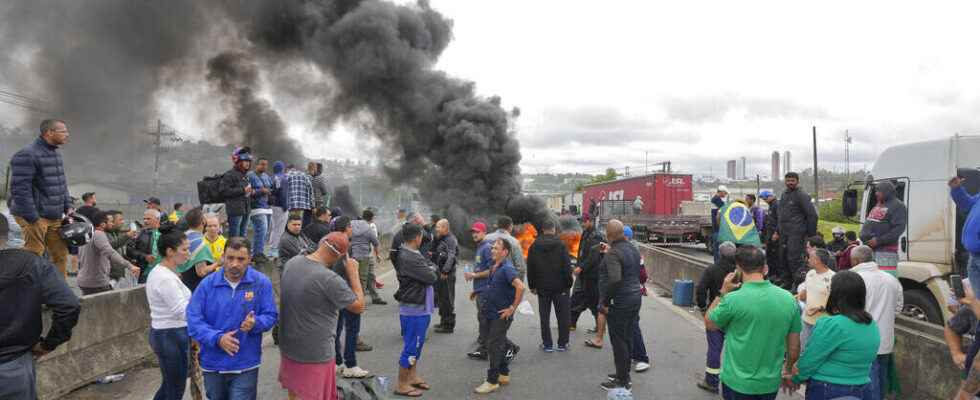In Brazil, road blockages intensified on Tuesday morning. Two days after Lula’s election as president, many truck drivers and pro-Bolsonaro protesters refuse to accept the defeat of the far-right president. The latter must finally speak on Tuesday and will not contest the results of Sunday’s election, according to the Minister of Communications.
It is high time for the outgoing president to admit defeat, according to O Dayfor who ” Bolsonaro’s silence gives green light to mobilization of extremists “. ” On Telegram, supporters demand a punch action on the Esplanade des Ministries [à Brasilia]talk about armed resistance and the call for the army in the federal capital, explains the Brazilian newspaper. This led ” the district security secretariat to block access to the Three Powers Square », adds Estadao.
Meanwhile, Lula begins – alone – his transition, without Bolsonaro’s team. President-elect start planning “. ” The campaign team is out, the transition team is in “, writing Correio Braziliense. It is expected to be led by the second name on the presidential ticket, Vice President Geraldo Alckmin. Lula also multiplies the phone calls to prepare a negotiation of the budget with the presidents of the Chamber of Deputies and the Senate.
► To read also: Brazil: Jair Bolsonaro silent since the victory of Lula da Silva
United States: surveillance or intimidation during early voting?
In the United States, D-7 before the midterm elections. For several days now, Americans have been able to vote in advance in several states, including Arizona, by depositing their ballot in dedicated mailboxes. But several voters complained, explains arizona republicthe presence near the places of deposit of people ” armed and equipped with bulletproof vests who film them and take pictures of their license plates. For groups defending the rights of voters, it is an attempt to intimidate. They filed a complaint against Clean Elections USA, the organization that oversees these monitoring groups.
The latter respond that they are fighting against ballot box stuffing. Some cite the controversial film “ 2,000 Slippers which claims the boxes were filled with fraudulent ballots during the 2020 election. These drop boxes “ have become a symbol of mistrust in elections », insists the washington post. Recently, a federal judge refused to ban the presence of these groups, but a new complaint may have a better chance of success, since the Department of Justice believes that they can ” constitute unlawful voter intimidation “.
► To read also: United States: an extremely polarized country for the midterm elections
Positive discrimination in question at the Supreme Court
Since Monday, positive discrimination has been on the wire, according to the washington post, which devotes its front page to the subject. ” Conservative justices appear set to end decades of case law that has allowed juries to take into account the skin color or ethnicity of their candidates in assessing their cases “, in order to diversify recruitment in their establishments and correct the inequalities resulting from the segregationist past of the United States.
Harvard, one of the oldest private universities in the country, is currently answering questions from Supreme Court justices. She defends her procedure; one official maintains that “ relying solely on grades and test scores could lead to a dramatic drop in the number of black and Hispanic students “. These arguments are disputed by the court’s conservative judges, including its patron, Justice Roberts. The hearing was particularly long – nearly five hours – and was well attended.
First Petro-Maduro meeting in Caracas
A meet is planned, this Tuesday in Caracas, between Colombian President Gustavo and his Venezuelan counterpart Nicolás Maduro, tells us The Heraldo. This is a first between these two countries since August 2016, before Venezuela and Colombia broke off diplomatic relations due to Bogotá’s support for opponent Juan Guaidó. This meeting raises great expectations, underlines El País, Cali newspaper. The urgency, according to the newspaper, is to regain institutional control of the border, undermined by drug and human trafficking, ” one of the scourges that most affect both countries “.
At the same time, many Venezuelan migrants are still trying to cross the border into the United States, explains Efecto Cocuyo. On Monday, in El Paso, Texas, the Border Patrol – the American border patrol – repelled a large group of migrants waving a Venezuelan flag. Rubber bullets were fired. A migrant shows in El Paso Times the wounds caused on his back by these projectiles.
Since October 12, recalls Efecto Cocuyo, many Venezuelan migrants were deported to Mexico and found themselves stranded in border towns. In Ciudad Juárez for example, dozens of people sleep on the banks of the Rio Grande “ waiting for a change in American policy “.
► To read also: Headlines: reopening of the border between Venezuela and Colombia
